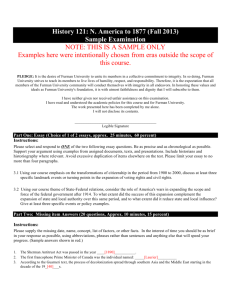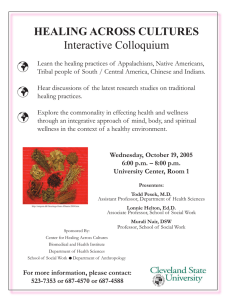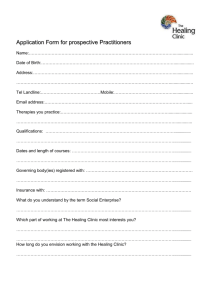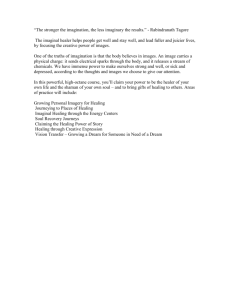The Heart Speaks: A Cardiologist Reveals the Secret Language of
advertisement
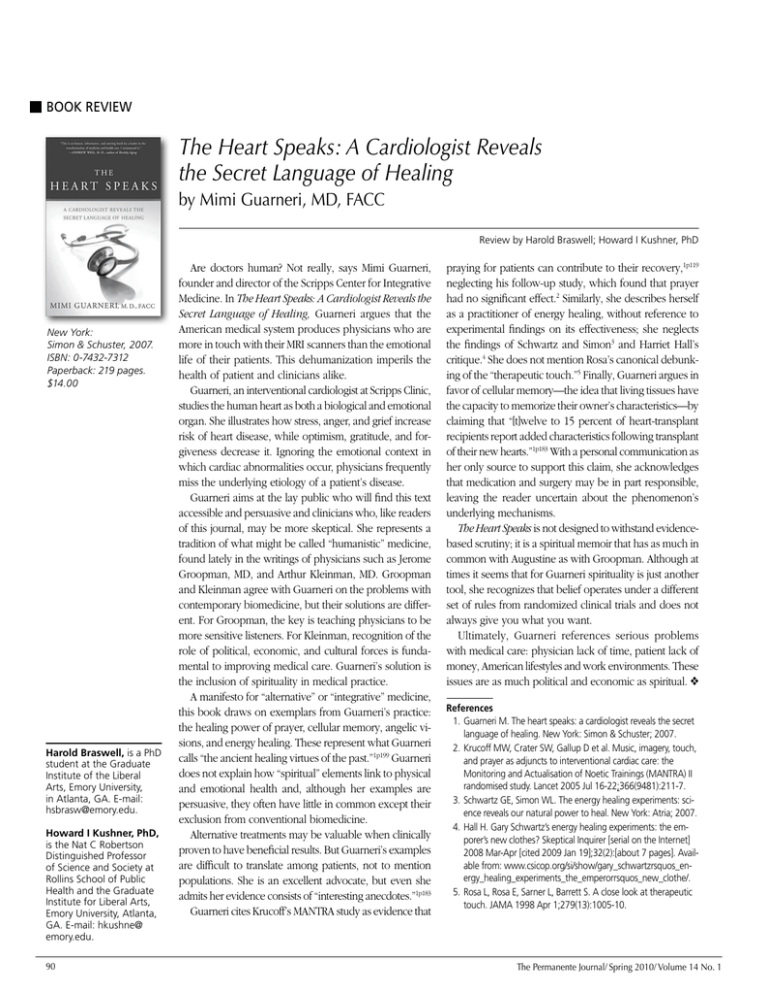
Book review The Heart Speaks: A Cardiologist Reveals the Secret Language of Healing by Mimi Guarneri, MD, FACC Review by Harold Braswell; Howard I Kushner, PhD New York: Simon & Schuster, 2007. ISBN: 0-7432-7312 Paperback: 219 pages. $14.00 Harold Braswell, is a PhD student at the Graduate Institute of the Liberal Arts, Emory University, in Atlanta, GA. E-mail: hsbrasw@emory.edu. Howard I Kushner, PhD, is the Nat C Robertson Distinguished Professor of Science and Society at Rollins School of Public Health and the Graduate Institute for Liberal Arts, Emory University, Atlanta, GA. E-mail: hkushne@ emory.edu. 90 Are doctors human? Not really, says Mimi Guarneri, founder and director of the Scripps Center for Integrative Medicine. In The Heart Speaks: A Cardiologist Reveals the Secret Language of Healing, Guarneri argues that the American medical system produces physicians who are more in touch with their MRI scanners than the emotional life of their patients. This dehumanization imperils the health of patient and clinicians alike. Guarneri, an interventional cardiologist at Scripps Clinic, studies the human heart as both a biological and emotional organ. She illustrates how stress, anger, and grief increase risk of heart disease, while optimism, gratitude, and forgiveness decrease it. Ignoring the emotional context in which cardiac abnormalities occur, physicians frequently miss the underlying etiology of a patient’s disease. Guarneri aims at the lay public who will find this text accessible and persuasive and clinicians who, like readers of this journal, may be more skeptical. She represents a tradition of what might be called “humanistic” medicine, found lately in the writings of physicians such as Jerome Groopman, MD, and Arthur Kleinman, MD. Groopman and Kleinman agree with Guarneri on the problems with contemporary biomedicine, but their solutions are different. For Groopman, the key is teaching physicians to be more sensitive listeners. For Kleinman, recognition of the role of political, economic, and cultural forces is fundamental to improving medical care. Guarneri’s solution is the inclusion of spirituality in medical practice. A manifesto for “alternative” or “integrative” medicine, this book draws on exemplars from Guarneri’s practice: the healing power of prayer, cellular memory, angelic visions, and energy healing. These represent what Guarneri calls “the ancient healing virtues of the past.”1p199 Guarneri does not explain how “spiritual” elements link to physical and emotional health and, although her examples are persuasive, they often have little in common except their exclusion from conventional biomedicine. Alternative treatments may be valuable when clinically proven to have beneficial results. But Guarneri’s examples are difficult to translate among patients, not to mention populations. She is an excellent advocate, but even she admits her evidence consists of “interesting anecdotes.”1p183 Guarneri cites Krucoff’s MANTRA study as evidence that praying for patients can contribute to their recovery,1p119 neglecting his follow-up study, which found that prayer had no significant effect.2 Similarly, she describes herself as a practitioner of energy healing, without reference to experimental findings on its effectiveness; she neglects the findings of Schwartz and Simon3 and Harriet Hall’s critique.4 She does not mention Rosa’s canonical debunking of the “therapeutic touch.”5 Finally, Guarneri argues in favor of cellular memory—the idea that living tissues have the capacity to memorize their owner’s characteristics—by claiming that “[t]welve to 15 percent of heart-transplant recipients report added characteristics following transplant of their new hearts.”1p183 With a personal communication as her only source to support this claim, she acknowledges that medication and surgery may be in part responsible, leaving the reader uncertain about the phenomenon’s underlying mechanisms. The Heart Speaks is not designed to withstand evidencebased scrutiny; it is a spiritual memoir that has as much in common with Augustine as with Groopman. Although at times it seems that for Guarneri spirituality is just another tool, she recognizes that belief operates under a different set of rules from randomized clinical trials and does not always give you what you want. Ultimately, Guarneri references serious problems with medical care: physician lack of time, patient lack of money, American lifestyles and work environments. These issues are as much political and economic as spiritual. v References 1.Guarneri M. The heart speaks: a cardiologist reveals the secret language of healing. New York: Simon & Schuster; 2007. 2.Krucoff MW, Crater SW, Gallup D et al. Music, imagery, touch, and prayer as adjuncts to interventional cardiac care: the Monitoring and Actualisation of Noetic Trainings (MANTRA) II randomised study. Lancet 2005 Jul 16-22;366(9481):211-7. 3.Schwartz GE, Simon WL. The energy healing experiments: science reveals our natural power to heal. New York: Atria; 2007. 4.Hall H. Gary Schwartz’s energy healing experiments: the emporer’s new clothes? Skeptical Inquirer [serial on the Internet] 2008 Mar-Apr [cited 2009 Jan 19];32(2):[about 7 pages]. Available from: www.csicop.org/si/show/gary_schwartzrsquos_energy_healing_experiments_the_emperorrsquos_new_clothe/. 5.Rosa L, Rosa E, Sarner L, Barrett S. A close look at therapeutic touch. JAMA 1998 Apr 1;279(13):1005-10. The Permanente Journal/ Spring 2010/ Volume 14 No. 1
